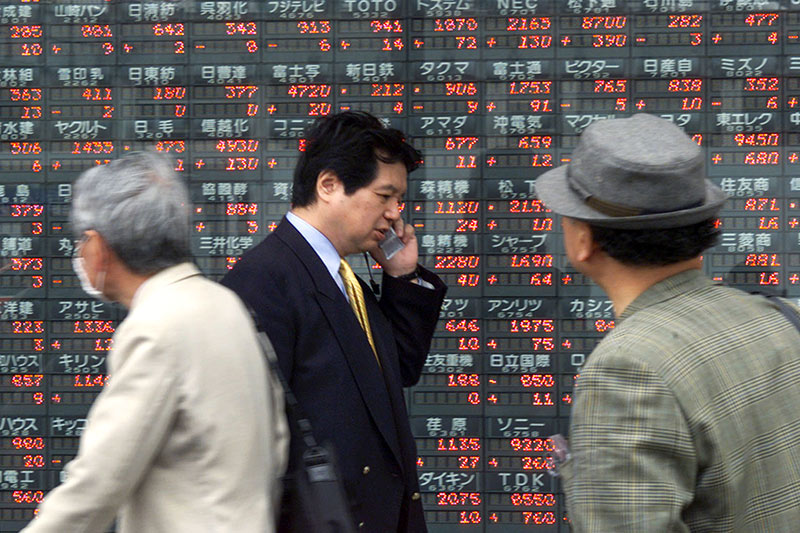(Bloomberg) -- Asian shares traded lower Thursday after Trump administration officials’ rhetoric on trade and the dollar roiled financial markets, sending the U.S. currency to its lowest level in three years and whipsawing stocks that had been buoyed by strong earnings.
The MSCI Asia Pacific dropped with technology and consumer shares weighing. Japan’s Topix index underperformed while Korean shares bucked the negative trend. Earlier, the S&P 500 closed flat after swinging between gains and losses. The yen steadied above 109 per dollar and Treasuries were little changed. West Texas Intermediate oil extended its climb above $65 a barrel for the first time in more than three years.
Treasury Secretary Steven Mnuchin’s endorsement of a weak dollar added to pressure on a greenback that’s been in decline for a year, although White House Press Secretary Sarah Sanders appeared to soften his comments later. The euro retreated from the highest since 2014 as eyes turn to the European Central Bank’s policy meeting on Thursday, where traders will be looking for for further clues on its appetite for rolling back stimulus, and its officials’ thoughts on a strengthening currency.
Investor focus on global trade has intensified after the U.S. officials’ comments added to President Donald Trump’s protectionist push days after his administration slapped tariffs on solar panels and washing machines. Commerce Secretary Wilbur Ross’s suggestion at Davos that the U.S. could enact more levies touched off concerns of a trade war that could hamper the synchronized global growth that’s sent equities around the world to all-time highs.
“To the extent that trade is disrupted, it’s probably not good for economies, for U.S. companies and corporations, and would probably put pressure on the rising stock market,” Michael Cuggino, president and portfolio manager at the Permanent Portfolio Family of Funds in San Francisco, said by phone. “I don’t think it’s a surprise that you have negative news that might be impacting the continuing march-up as people take a pause.”
Elsewhere, the Brazilian real strengthened the most in eight months and the Ibovespa stock exchange rose to a record after a panel of judges upheld the conviction of former President Luiz Inacio Lula da Silva on graft, a ruling that would prevent him from running in the general election.
Terminal users can read more in our markets blog.
Here’s what to watch out for this week:
- Earnings season is in full swing: Intel (NASDAQ:INTC), LVMH Moet Hennessy Louis Vuitton, Starbucks (NASDAQ:SBUX) and Hyundai Motor all come this week.
- Barring any last minute changes in Washington, Trump will join world leaders and senior executives in Davos for the annual World Economic Forum.
- The European Central Bank announces its rate decision on Thursday
- The U.K. House of Lords is considering Prime Minister Theresa May’s Brexit bill this week.
These are the main moves in markets:
Stocks
- The MSCI Asia Pacific Index sank 0.3 percent as of 9:16 a.m. Tokyo time.
- Japan’s Topix index sank 0.8 percent.
- Kospi index rose 0.3 percent.
- Australia’s S&P/ASX 200 Index fell 0.2 percent.
- Futures on the S&P 500 Index fell 0.1 percent.
Currencies
- The Bloomberg Dollar Spot Index gained 0.1 percent.
- The Japanese yen fell 0.1 percent to 109.32 per dollar.
- The euro fell 0.1 percent to $1.2391.
Bonds
- The yield on 10-year Treasuries rose less than one basis point to 2.65 percent.
- Japan’s 10-year yield rose less than one basis point to 0.088 percent.
Commodities
- West Texas Intermediate crude rose 0.4 percent to $65.85 a barrel.
- Gold fell 0.2 percent to $1,356.29 an ounce.
